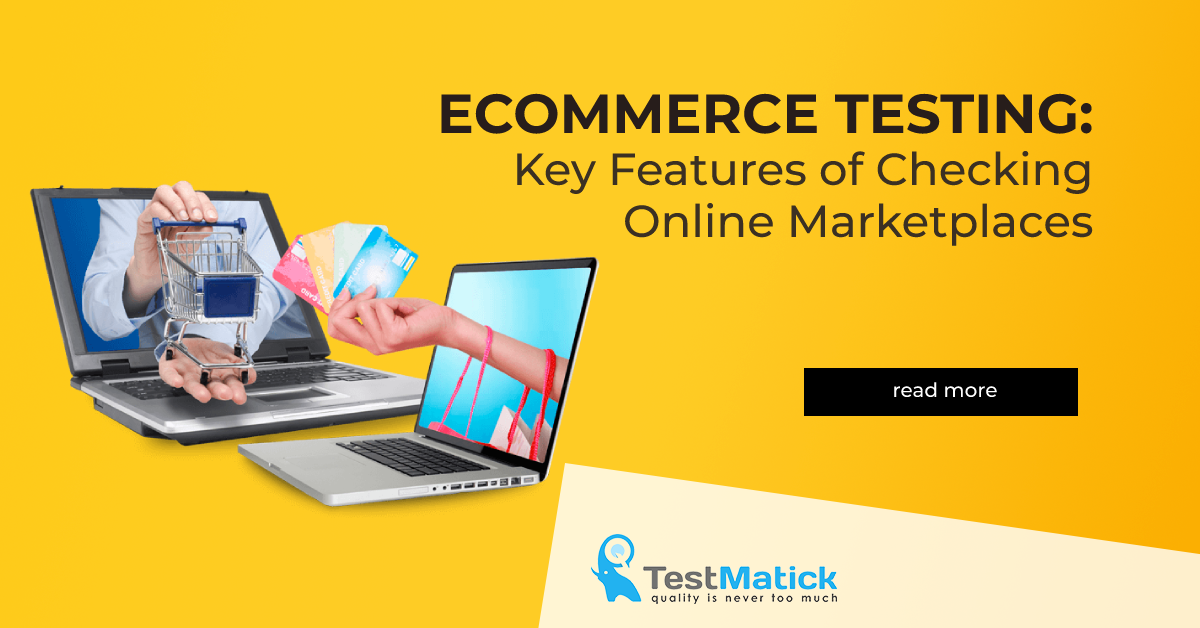Experts predict that by the end of 2021 the number of online shoppers worldwide will exceed 2.1 billion people. The instant accessibility, maximum convenience, and profitability of virtual commerce are forcing more and more companies and corporations to create personal digital marketplaces further expanding their trading platforms on the Web!
Without doubt, the development of online stores is a good way to expand the customer base. This instantly adapts business solutions to today’s challenges (pandemic, economic fluctuations, etc.).
A great commercial web portal is the key to your rapid success! It must be a worthy analog of a storefront. But since there are a lot of sites on selling topics and specifics, it is necessary to create such web products with thoroughly tested functionality (from an external graphical interface to internal system operations and interactions).
Usually, ecommerce testing is verification according to the following criteria:
- A/B testing;
- Mobile app testing (if they’re in the specification and a client want it);
- Database testing;
- Performance testing;
- System security testing;
- Usability testing;
- Functional tests.
A/B Testing
First of all, this type of testing allows detecting the main preferences of virtual customers in some online stores. Sometimes a certain commercial website has a small number of sales even though the efforts made to optimize it were quite significant. Even one little button (if it’s in the wrong place on a page) can significantly reduce the conversion.
To avoid such situations, specialists perform A/B testing which results are realized on a site. Ultimately, this should provide an acceptable conversion across all key metrics (from purchase to advertising and awareness).
One part of users interacts with one version of the site, and the second one interacts with another. Hence, you can easily find out which version is more effective and what shortcomings can and should be corrected in a “weaker” version.
Mobile Product Testing (Mobile Version of a Store)
Many people in the modern world use portable gadgets to perform a lot of actions on the global network. Obviously, this trend is prompting companies to rethink their forward-looking strategies for thorough ecommerce testing. They also start focusing on the implementation of many solutions specifically for portable gadgets.
Now, testing the mobile version of a site or any other software is an important part of achieving corporate and commercial success.
Before starting the process of testing a mobile product, it is worth answering several important questions, namely:
- How fast the pages are loading?
- Can provided content be considered engaging?
- Is it easy for a client to navigate on a site?
- Do landing pages arouse interest in other website sections?
Database Testing
This check is responsible for elements that are visually inaccessible to an ordinary user. We are talking about internal system processes, indexes, tables, database servers, and duplication of data groups. Additionally, testers check the state of information integrity and consistency.
You should also focus on testing the database under load using database stress testing methods. Such checks are very good for quickly detecting the system’s point of failure. Moreover, they give a wide infographic of at what peak loads the software can function correctly and at which ones it will break.
Performance Tests
Page loading speed greatly affects the performance of any web portal in all possible aspects from systemic interaction with potential users to the correctness of search results. As analytics show, if the site is loading for more than 4-5 seconds, users immediately leave the resource and go to other sites.
It is extremely important to check the online store to assure that the system can function effectively under a certain load, all the pages are accessible and are loading quickly.
Additionally, it is recommended to focus on the implementation of the SEO strategy components (title tags, alternative image tags, meta descriptions, etc.).
Security Level Verification
Detection of system security defects and vulnerabilities is a basic criterion that should be taken into account during general testing of any e-commerce website. Since such sites contain personal information about visitors (contacts, name, banking, and other payment systems), the issue of security testing is the cornerstone of any software testing.
Among the testing techniques, specialists usually emphasize using SQL code, ethical hacking (test), and the execution of secure cyber attacks to search for open software vulnerabilities.
Usability Testing
A well-designed and user-friendly e-commerce website always attract the attention of potential customers. Even the smallest web elements significantly affect the way how users evaluate the entire site.
Nowadays, usability is quite an important factor. QA engineers should test absolutely everything from the buttons form to text in push notifications and so on.
Functional Tests
Functional testing is like the basis of any e-commerce web portal. If software cannot perform its initial functions, nobody will use it.
To make the functionality of the product of the highest level, it is important to test the complete workflow (from the customer role to the administrator and manager capabilities). First of all, QA must thoroughly check the following:
- Ability to log into account;
- Registration;
- The process of buying items or services;
- Processing of orders;
- Making payments.
Conclusion
Any ecommerce website should be thoroughly tested to make the quality of service virtual users pleasant and effective for both sides.
Missed important bugs lead to immediate growth of dissatisfied users, loss of business profit, and “points” from marketing policy and sales. All this means that every part of such software needs to be tested as qualitatively as possible!










Leave A Comment